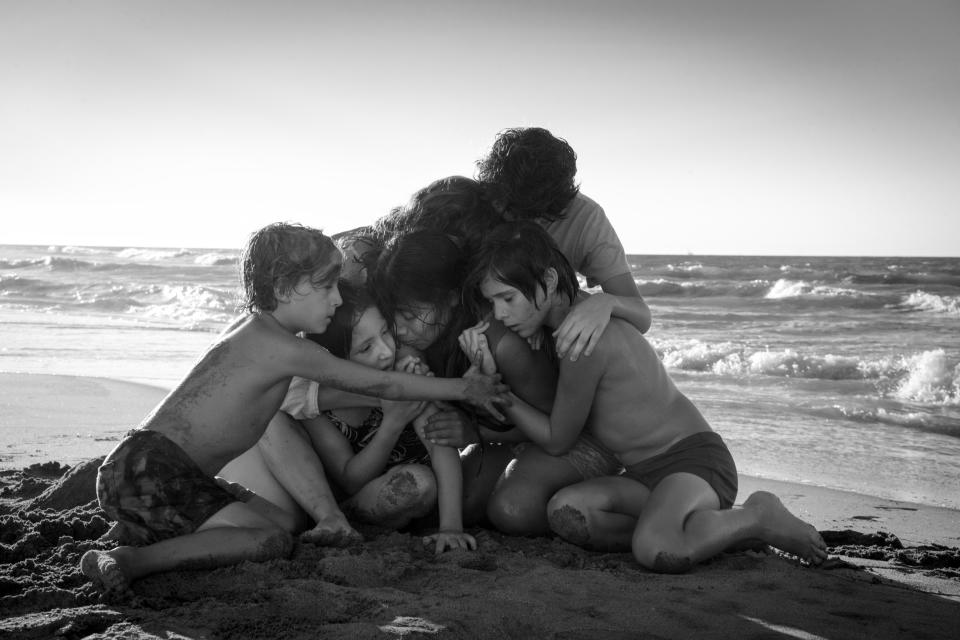Yahoo News explores the impact of 'Roma' on real-life domestic workers
Over the course of his career, Oscar-winning filmmaker Alfonso Cuarón has transported moviegoers to outer space (Gravity), dystopian futures (Children of Men) and wondrous schools of witchcraft and wizardry (Harry Potter and the Prisoner of Azkaban). For his eighth narrative feature, Roma, the Mexican-born writer-director chose to explore terrain that’s closer to home — and won his second Best Director Oscar as a result.
Based on the director’s own childhood experiences growing up in ’70s-era Mexico City, Roma — which received 10 Oscar nominations and won three statues this year — tells the story of Cleo (played by first-time actress Yalitza Aparicio), a young woman employed as a maid and nanny for a middle-class family. Cleo is modeled directly after the domestic worker who raised the young Cuarón and his siblings, Liboria Rodríguez, or as he affectionately called her from the time he learned to speak, “Libo.” Speaking with Variety last year, Rodríguez described the surreality of watching her past translated to the screen. “I never imagined everything I’m living right now, that a film would be based on me.”
While it tells a very specific story set in an equally specific time and place, Roma nevertheless illustrates universal experiences shared by contemporary domestic workers. To drive home the connection between Cuarón’s past and our present, one of the production companies behind Roma, Participant Media, partnered with the National Domestic Workers Alliance (NDWA) for a campaign designed to highlight the stories of the 70 million real-life Cleos employed in homes around the world as cleaners and caregivers. For a Yahoo News story, Through Her Eyes host Zainab Salbi and director-producer Samantha Feltus profiled one such domestic worker, currently employed by a New York City family. (Watch the video above.)

Salbi spoke with Namrata Pradhan, who was a lawyer in Nepal working with the Legal Aid & Consultancy Center and who emigrated to the United States two decades ago with plans to pursue a master’s degree in law. “But when I went to the college, the tuition fee was too much,” she tells Salbi. In the face of mounting debts, she left school in 2003 and moved to New York City for a job as a nanny. It wasn’t an easy transition. “To be honest, I feel bad in the beginning,” she says now. “I thought, ‘All my dreams are now scattered.’”
Eventually, Pradhan built a new life with her current family, who she’s worked with for the past seven years. “They are my joy, my laughter, my everything,” she says of the two young children she cares for, and praises their parents for valuing the work she does. And that work isn’t exclusive to their household; Pradhan is also closely involved with the Nepali advocacy organization, Adhikaar, as well as the NDWA.
Since 2007, the latter group has sought to bring attention to the plight of domestic workers who haven’t necessarily been as fortunate as Pradhan in their employment situation. In many cases, these women work without benefits like paid vacation, sick leave or health insurance. “It’s so invisible and undervalued in our culture and in our economy,” NDWA executive director, Ai-jen Poo, tells Salbi. “And Roma offers us this opportunity to really shine a light on that and then think about what we can do to change that.”
On Oscar night, Pradhan and 30 other domestic workers — all dressed in runway-ready fashions — watched Roma win its three statues at a viewing party held at Los Angeles workspace the Jane Club. “This is our night; we are shining stars,” she said on the red carpet ahead of the event. Also in attendance were several NDWA staff members, including political director Jess Morales Rocketto, special projects director Alicia Garza and gender justice campaign director Monica Ramirez, as well as celebrities like Rashida Jones, Eva Longoria and June Diane Raphael. “I’m able to be the best mother that I could possibly be with the village of support that’s provided by the domestic workers in my life,” said Raphael, star of the hit Netflix series Grace and Frankie.

The NDWA-Roma partnership won’t end with the Oscars. Having successfully led initiatives to pass rights legislation for domestic workers in eight U.S. states — Hawaii, New York and Oregon among them — the NDWA is now focused on supporting a federal-level National Domestic Workers Bill of Rights. Co-sponsored by California senator (and 2020 Democratic presidential candidate) Kamala Harris and Washington state Rep. Pramila Jayapal, the legislation will be introduced to Congress later this year and seek to address issues like the lack of benefits and protections for domestic workers, as well as the loopholes that continue to make them exempt from federal labor laws. The NDWA also recently launched Alia, an online benefits platform specifically designed for house cleaners. Through the site, employers can ensure their cleaners will be able to access such benefits as paid time off and accident insurance policies. (To learn more, visit the campaign’s website.)
Back at the Oscars viewing party, Pradhan and her fellow domestic workers cheered loudly when Javier Bardem and Angela Bassett announced Roma as the winner for Best Foreign Language Film. “I’m so happy; this is our moment,” Pradhan tells a visibly moved Salbi. “We deserves this day — this night.”
Roma is currently streaming on Netflix.
Read more from Yahoo Entertainment:


